Halal burger have become a culinary favorite worldwide, offering a perfect balance of ethical standards, mouthwatering flavors, and inclusivity. Whether you’re a seasoned foodie or new to halal cuisine, understanding what makes these burgers special is essential. In this guide, we’ll walk you through everything you need to know, from the right ingredients to step-by-step preparation. Let’s dive into the world of halal burgers and uncover what makes them a delightful addition to any menu.
Table of contents
How to Make a Halal Burger Step-by-Step
Ingredients for the Perfect Halal Burger
The foundation of a great halal burger lies in the quality and authenticity of its ingredients. To create a flavorful halal burger, ensure that every item is halal-certified and of premium quality. Here’s what you’ll need:
- Halal-certified ground beef or chicken: 500 grams
- Halal-certified burger buns: 4
- Fresh lettuce leaves: 4 pieces
- Tomato slices: 8 slices
- Onion rings: 8 rings
- Cheddar cheese (optional): 4 slices
- Mayonnaise, ketchup, or mustard (optional): As per taste
- Spices:
- Salt: 1 teaspoon
- Black pepper: 1 teaspoon
- Garlic powder: ½ teaspoon
- Paprika: ½ teaspoon
- Oil or butter for cooking: 2 tablespoons
For those who enjoy exploring variations, you can substitute the beef with lamb or infuse your patties with a touch of Middle Eastern flair by adding cumin or coriander. Pairing your burger with a tropical dessert, like the Pineapple Pie Recipe, can create an exotic culinary experience.
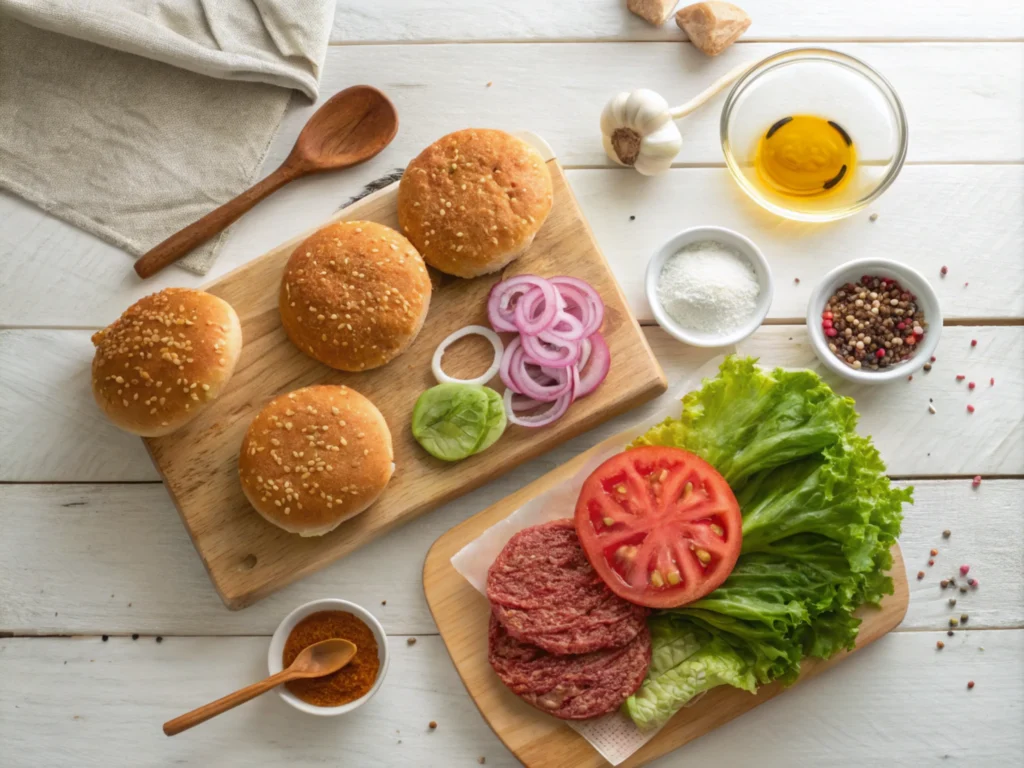
This carefully curated list of ingredients ensures your burger not only adheres to halal standards but also delivers on flavor and satisfaction.
Preparation Steps for Your Halal Burger
Crafting a halal burger begins with meticulous preparation. Each step contributes to the final result, ensuring your burger is both delicious and structurally sound.
- Prepare the Patties
In a large mixing bowl, combine the halal-certified ground meat with salt, black pepper, garlic powder, and paprika. Mix thoroughly to evenly distribute the spices. Divide the mixture into four equal portions and gently shape them into patties. For best results, make the patties slightly larger than the buns to account for shrinkage during cooking. - Toast the Buns
Halal-certified buns provide a sturdy base for your burger. Slice each bun in half and spread a thin layer of butter on the cut sides. Toast them on a skillet over medium heat until golden brown. This simple step elevates the texture and flavor of your burger, creating a light crunch that pairs perfectly with the juicy patties. - Prepare the Vegetables
Fresh produce is essential for a balanced burger. Wash and pat dry the lettuce leaves. Slice the tomatoes into uniform rounds and cut the onions into rings. These elements add freshness and crunch, creating a well-rounded bite. - Optional Add-Ons
Consider adding a creative twist, like avocado slices or pickled onions, to enhance the flavor profile. For a low-carb alternative to traditional buns, try adapting the techniques from the Sub in a Tub Recipe, which offers a lighter, health-conscious approach to sandwich-making.
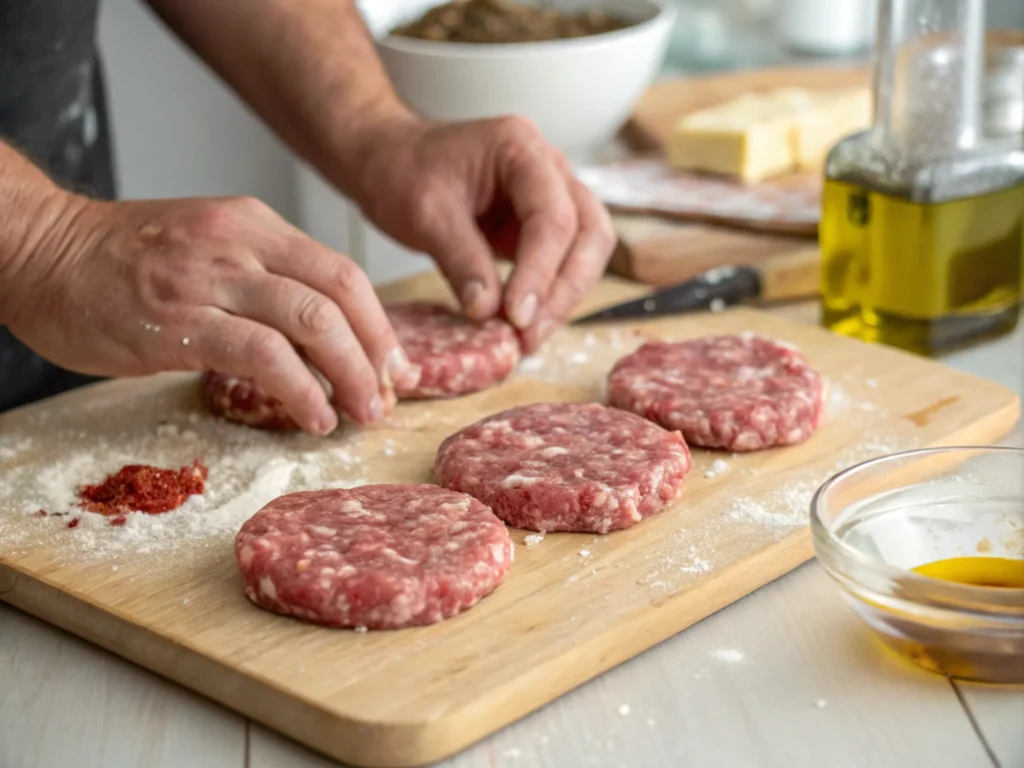
These preparation steps ensure that you’re fully organized before the cooking process, making it smoother and more enjoyable.
Cooking Instructions for Halal Burgers
Once your ingredients are prepped, it’s time to bring your burger to life. Cooking halal-certified meat requires attention to detail to ensure it’s both flavorful and compliant with halal standards.
- Heat the Pan or Grill
Preheat a skillet or grill over medium-high heat, and subsequently, add a tablespoon of oil or butter to prevent the patties from sticking. Moreover, a properly heated surface ensures even cooking and, in addition, creates a beautiful sear on the patties. - Cook the Patties
Gently place the patties on the hot skillet or grill, and moreover, avoid overcrowding the surface so as to allow even cooking. Sear each side for 3–4 minutes to develop a golden crust; additionally, for a well-done burger, extend the cooking time by 2 minutes per side. Furthermore, to ensure food safety, verify that the internal temperature of the patties reaches 160°F (71°C). - Melt the Cheese (Optional)
If you’re adding cheese, place a slice on top of each patty during the last minute of cooking. Cover the skillet with a lid to create a steamy environment that melts the cheese perfectly. - Assemble the Burger
Begin assembly by placing a crisp lettuce leaf on the bottom half of the toasted bun; afterward, layer it with a juicy patty, a slice of tomato, and a few onion rings. Additionally, add condiments such as mayonnaise, ketchup, or mustard, according to your preference. Lastly, finish with the top half of the bun to crown your creation beautifully. - Serve and Enjoy
Present the burgers immediately, pairing them with crispy fries or a fresh salad for a complete meal. For a satisfying dessert afterward, consider trying a tropical favorite like the Pineapple Pie Recipe, which complements the bold flavors of the burger.
Expert Tips for Perfect Halal Burgers
- Retain Juiciness: Avoid pressing the patties with a spatula while cooking, as this can squeeze out the juices and dry them out.
- Flavor Enhancers: For added depth, mix in a teaspoon of Worcestershire sauce (halal-certified) with the ground meat.
- Experiment with Toppings: Elevate your burger with gourmet toppings like caramelized onions, pickled jalapeños, or a fried egg.
By following these steps and tips, you’ll create a halal burger that’s both delicious and compliant with ethical standards, offering a satisfying meal for everyone at the table.
Pro Tips & Variations
Substituting Beef with Halal Lamb or Chicken
Halal burgers don’t have to rely solely on beef. Using halal lamb can bring a rich, earthy flavor to your patties, perfect for pairing with robust spices like rosemary or cumin. Alternatively, chicken offers a lighter option. Ground halal chicken works well with herbs like cilantro and parsley, making it ideal for those seeking a leaner, protein-packed alternative. If you’re a fan of creative spins on recipes, take inspiration from the Cottage Cheese Recipes to experiment with unique flavors and healthier ingredients.
Creative Topping Suggestions
Elevate your halal burger with unique toppings. Creamy avocado slices add a buttery texture, while pickled onions provide a tangy contrast. For a burst of freshness, try arugula or microgreens instead of lettuce. Cheese lovers can opt for halal cheddar, Gouda, or even a slice of halal halloumi for a Mediterranean twist.
Adapting Recipes for Regional Flavors
Infuse regional flair into your halal burger by incorporating spices and ingredients inspired by global cuisines; for instance, for a Middle Eastern-inspired burger, you can season your patties with za’atar or sumac, and additionally, top them with tahini sauce or labneh. Similarly, for Asian-inspired burgers, you could include teriyaki-glazed patties garnished with pickled vegetables, and moreover, add a drizzle of sriracha mayo to enhance the flavor.
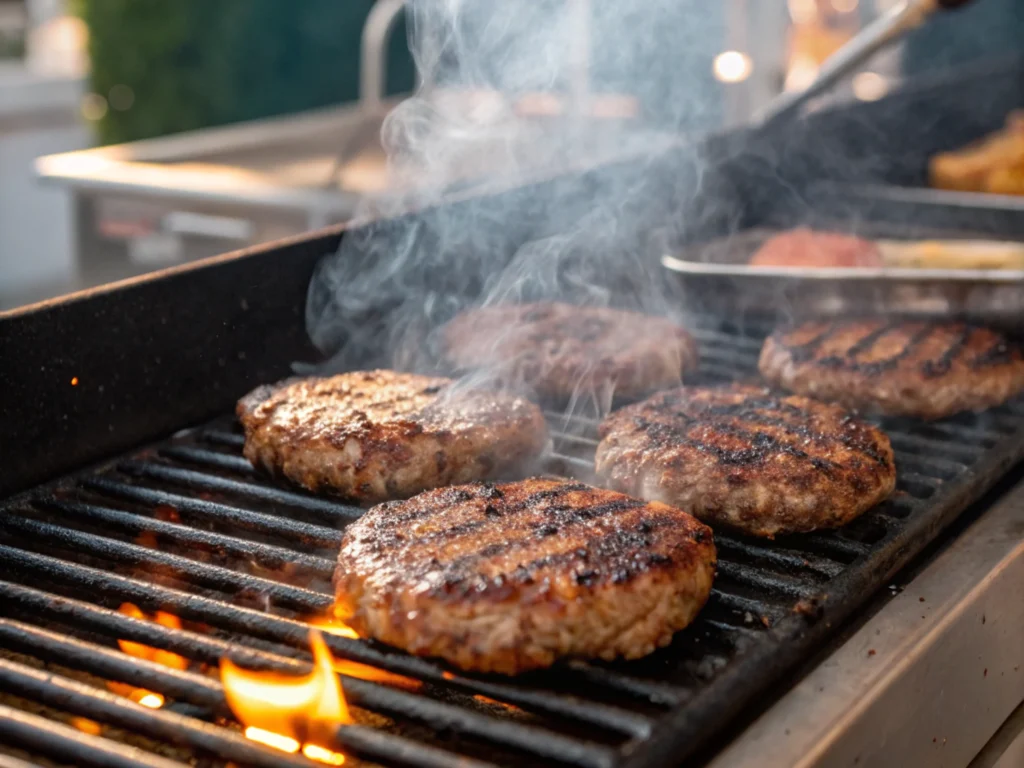
Benefits of Halal Burgers
Ethical Sourcing and Animal Welfare
Halal meat ensures ethical sourcing and humane treatment of animals, and additionally, the slaughter process adheres to Islamic guidelines, which, moreover, prioritize minimizing the animal’s suffering and ensuring it is healthy at the time of slaughter.
Higher Quality Assurance
Halal certification demands stringent quality checks, ensuring that the meat is free from harmful additives and contaminants. This emphasis on quality often translates into fresher, cleaner-tasting meat compared to non-halal alternatives.
Inclusivity and Broader Appeal
Halal burgers cater to a wider audience, including those who follow halal dietary laws and those who appreciate ethical food sourcing. By offering halal options, restaurants and home cooks alike can create meals that are inclusive and respectful of diverse dietary needs. For additional creative meal inspirations, check out the Travel Cake Guide, which pairs wonderfully with themed dining experiences.
Common Mistakes to Avoid
Using Non-Halal Ingredients Unknowingly
One of the most common mistakes is unknowingly incorporating non-halal ingredients, such as sauces containing alcohol or buns with lard. Always check labels for halal certification to ensure compliance.
Cross-Contamination During Preparation
Avoiding cross-contamination is critical. Use separate utensils, cutting boards, and cooking surfaces for halal foods to ensure they don’t come into contact with non-halal items. Washing hands thoroughly before handling halal ingredients is also essential.
Overlooking Halal Certifications on Processed Items
Not all pre-packaged ingredients are halal, even if they seem permissible. Look for the halal certification logo on processed items like sauces, cheeses, and condiments to guarantee compliance.
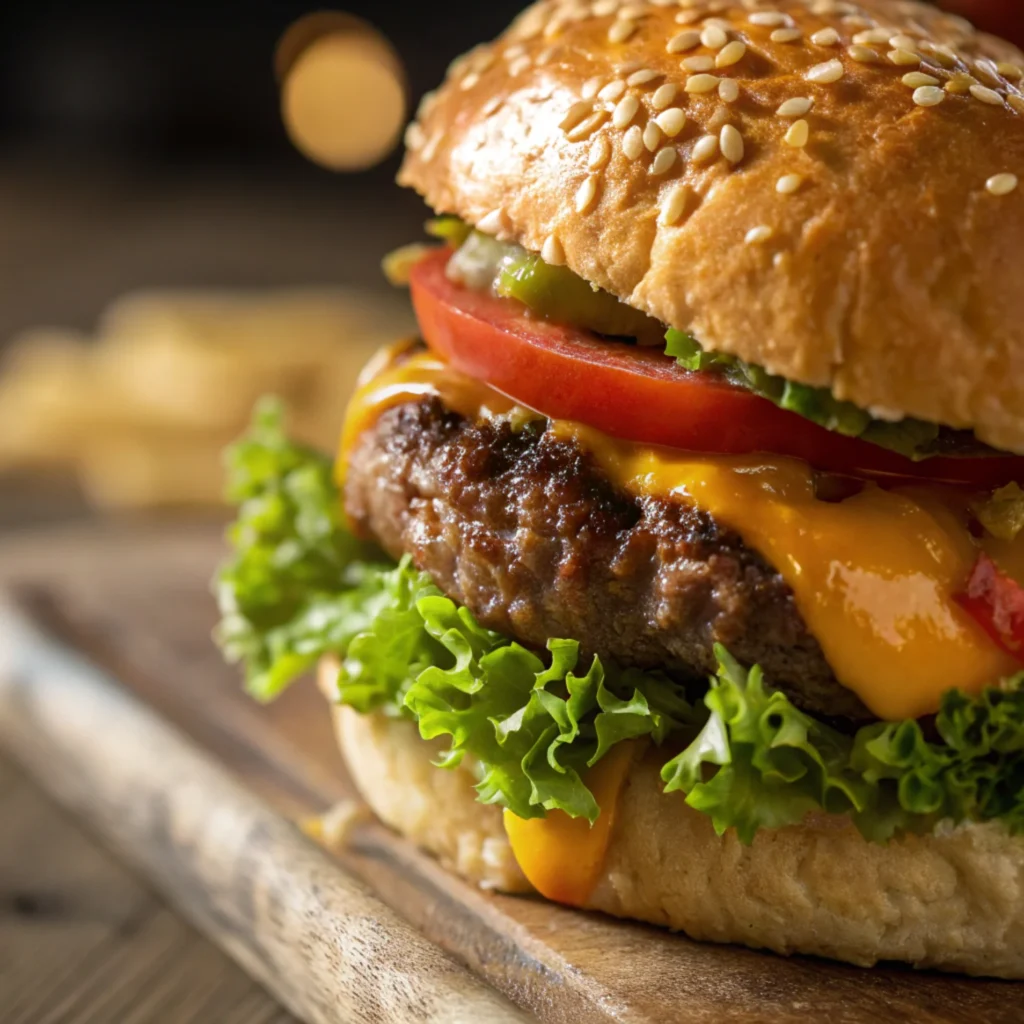
FAQs About Halal Burgers
What Makes a Burger Halal?
A burger is halal when it adheres to Islamic dietary laws. This includes using halal-certified meat, ensuring humane animal treatment, and preparing the food in a way that avoids contact with non-halal substances like alcohol or pork.
What Is Different About a Halal Burger?
Halal burgers are made with ethically sourced, halal-certified meat and halal-compliant ingredients. The preparation process also ensures no cross-contamination with non-halal items, setting them apart from standard burgers.
Is Domino’s Burger Halal?
The halal status of Domino’s burgers varies by region. In some areas, Domino’s offers halal-certified menu items, but it’s important to verify with the specific outlet and look for halal certification.
What Is Halal Beef Meat?
Halal beef comes from cattle slaughtered in accordance with Islamic principles. This process involves invoking the name of Allah during slaughter and ensuring the animal is healthy and treated humanely.
How Do I Verify If a Burger Is Halal?
To verify a burger’s halal status, check for certification from reputable halal authorities. Restaurants and food brands often display these certifications on their menus or packaging. When in doubt, ask the establishment directly.
Are Halal Burgers Healthier Than Regular Burgers?
Halal burgers often use higher-quality meat due to strict certification standards, which may result in fewer additives and preservatives. While not inherently healthier, they are often perceived as cleaner and fresher.
What Are Popular Halal Burger Chains Globally?
Popular halal burger chains include Al Baik in Saudi Arabia, as well as GBK (Gourmet Burger Kitchen) in the UK, and moreover, several McDonald’s and KFC outlets in regions like Malaysia and the UAE, where, in addition, halal options are widely available.
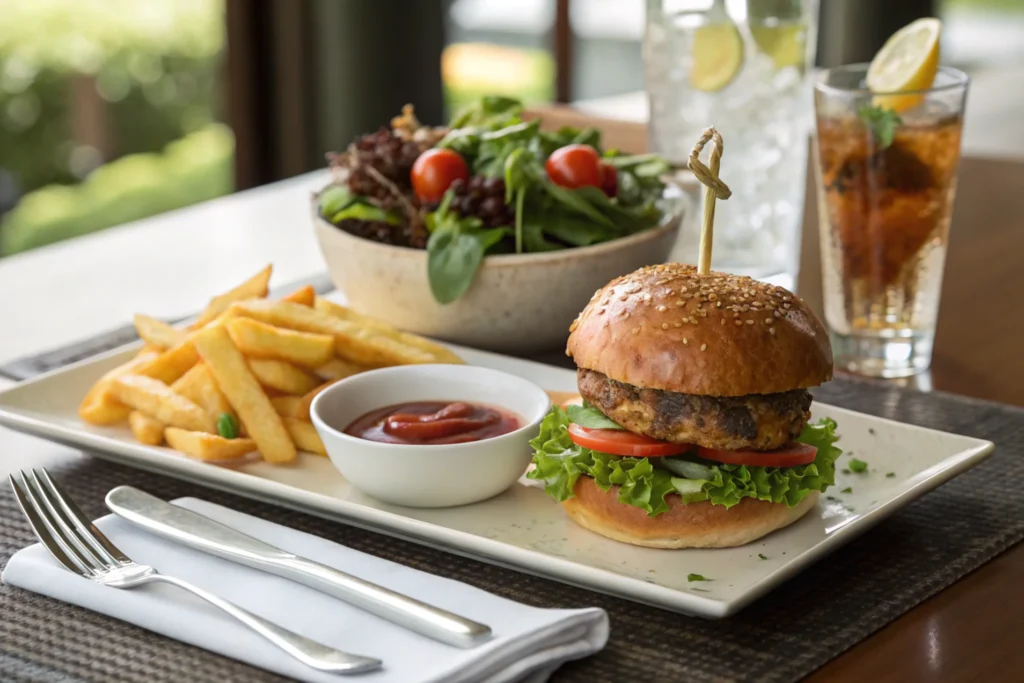
Conclusion
Halal burgers are more than just a meal—they are a reflection of ethical eating and culinary creativity. They cater to diverse audiences, offering a flavorful and inclusive dining experience that aligns with Islamic dietary laws and modern food trends.
By embracing halal burgers, you’re supporting humane animal treatment and quality assurance while enjoying a delicious and versatile dish. Whether you prefer beef, lamb, or chicken, the possibilities for customization are endless.
Now that you’ve learned how to prepare, enhance, and appreciate halal burgers, why not try making one at home? Or, visit a local halal-friendly restaurant to explore the flavors for yourself. Halal burgers are a celebration of taste, ethics, and inclusivity—perfect for any occasion.

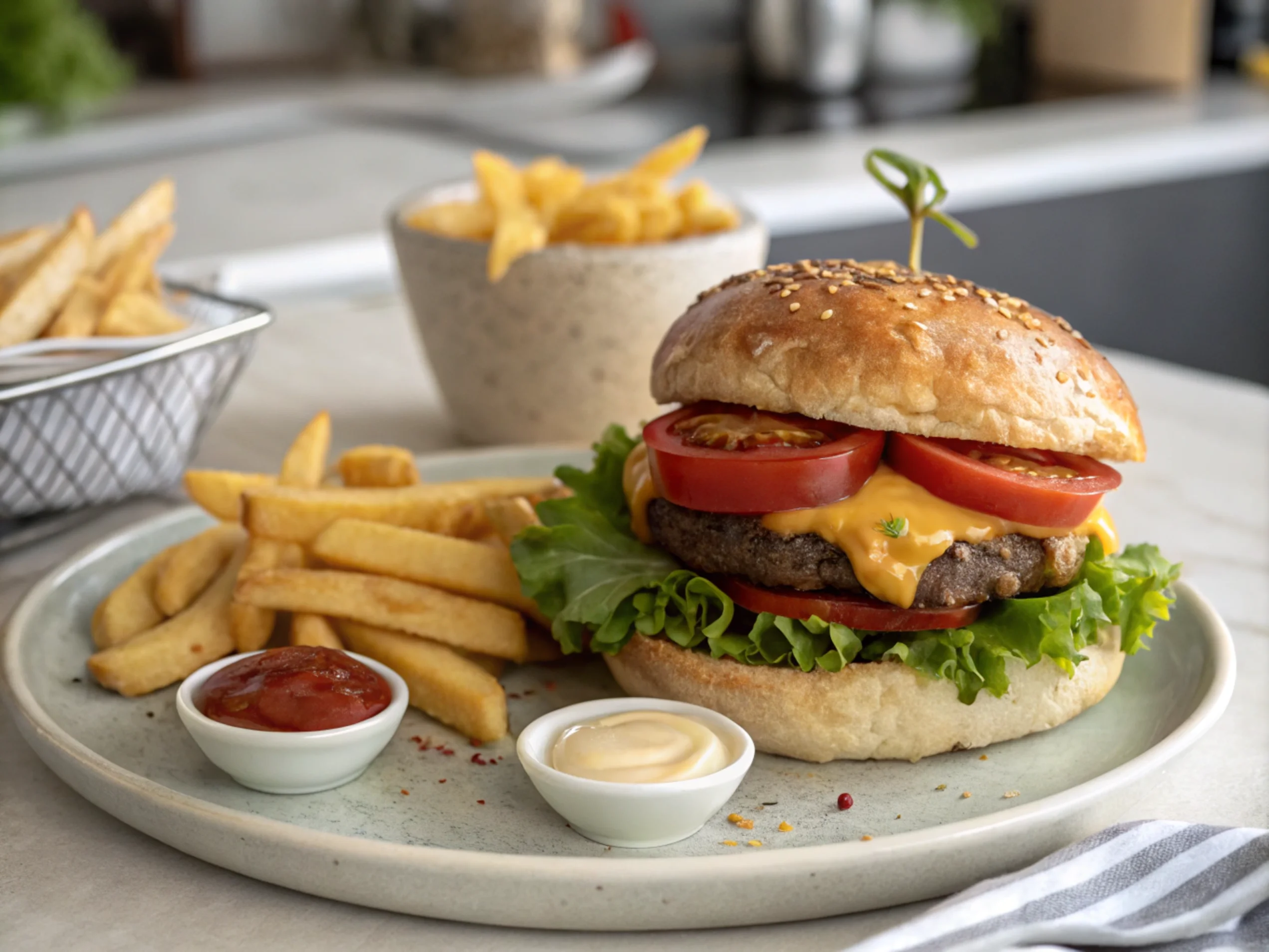
2 thoughts on “Halal Burger: Everything You Need to Know About This Ethical Delight”